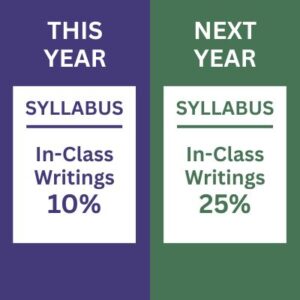 |
| Procrastinertia. You know that feeling—you’re not actually getting anything done, yet somehow, just the effort of resisting productivity is exhausting. It’s all too familiar as we approach summer, caught between the impulse to rest and the persistent nagging of productivity. Last year at this time, I encouraged you to flip the narrative and schedule your downtime first, treating it as sacred space around which other activities must orbit. |
Teaching Tips
Articles and resources to empower your teaching experience.
Teaching: Rethinking Assessment- Reweighting Low Risk
 |
| In my March 25 TTT contribution, I promised some suggestions for how to rethink assessment. If a high-stakes writing assignment can be adequately created with gen-AI, assessing that piece of writing does not provide an accurate measure of how well a student has met a set of learning goals. Instead, we need to seek additional evidence. |
Teaching: A Simple Hack for Focused Discussions- The Follow-Up List
 |
| Ever feel that tug of tension when a student asks a really thoughtful question—right in the middle of a tightly timed class? You want to honor their curiosity, but you also know: if you go down that rabbit hole, you may not get where you need to go that day. A detour now and then can be invigorating, sure. |
Teaching: Breaking the Ice, Building the Conversation

At the Open Doors debrief, Dan Homan (Physics) shared a small but powerful practice he uses early in the semester to break the ice and cultivate an engaged classroom. In the first few weeks, he gives students a brief in-class writing prompt—just two minutes responding to the reading—and then asks for volunteers to read their responses aloud with dramatic flair.
Teaching: This Just Happened

Lately, I’ve been saying that keeping up with AI feels a bit like being stuck on a treadmill that only speeds up. Just when I think I’m catching my breath, something new barrels in. In the past few weeks alone, I’ve heard about “vibecoding”—the emerging ability to speak complex code into existence like some kind of techno-conjuring spell—and OpenAI’s latest image tools, which have taken deepfakes from disconcerting to downright uncanny. |
Teaching: Real World Connections, Active Learning, and Collaborative Knowledge-Building
 |
||
|
Teaching: Unpacking Complexity
 |
||
|
Teaching: Validity Matters More than Cheating

In a CfLT-sponsored webinar on assessment and gen-AI on March 3, Leon Furze (longtime educator, education administrator, and now Ph.D. candidate working on a dissertation on AI in writing instruction) shared an academic article, “Validity Matters More than Cheating,” which argues that academic integrity needs to focus on “assessment validity” rather than “cheating.” Cheating is a question of moral integrity, whereas validity is a process by which educators ensure that students have met learning outcomes.
Teaching: Kids These Days Can’t Read

I’ve been in education long enough to recognize this as a familiar faculty lament. Over the years, I’ve heard numerous concerns:
- Kids these days can’t compute a square root.
- Kids these days can’t graph (or factor) a third-degree polynomial.
- Kids these days can’t use an abacus.
You see the pattern. It seems that the longer we teach, the more likely we are to encounter this sentiment.
Teaching: Responsive Teaching in Action
 |
||
|
